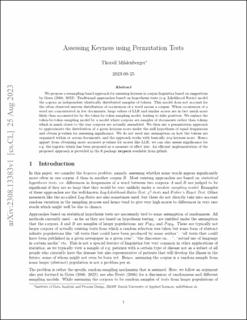Please use this identifier to cite or link to this item:
https://doi.org/10.21256/zhaw-28571Full metadata record
| DC Field | Value | Language |
|---|---|---|
| dc.contributor.author | Mildenberger, Thoralf | - |
| dc.date.accessioned | 2023-09-01T13:16:30Z | - |
| dc.date.available | 2023-09-01T13:16:30Z | - |
| dc.date.issued | 2023-08 | - |
| dc.identifier.other | arXiv:2308.13383 | de_CH |
| dc.identifier.uri | https://digitalcollection.zhaw.ch/handle/11475/28571 | - |
| dc.description.abstract | We propose a resampling-based approach for assessing keyness in corpus linguistics based on suggestions by Gries (2006, 2022). Traditional approaches based on hypothesis tests (e.g. Likelihood Ratio) model the copora as independent identically distributed samples of tokens. This model does not account for the often observed uneven distribution of occurences of a word across a corpus. When occurences of a word are concentrated in few documents, large values of LLR and similar scores are in fact much more likely than accounted for by the token-by-token sampling model, leading to false positives. We replace the token-by-token sampling model by a model where corpora are samples of documents rather than tokens, which is much closer to the way corpora are actually assembled. We then use a permutation approach to approximate the distribution of a given keyness score under the null hypothesis of equal frequencies and obtain p-values for assessing significance. We do not need any assumption on how the tokens are organized within or across documents, and the approach works with basically *any* keyness score. Hence, appart from obtaining more accurate p-values for scores like LLR, we can also assess significance for e.g. the logratio which has been proposed as a measure of effect size. An efficient implementation of the proposed approach is provided in the `R` package `keyperm` available from github. | de_CH |
| dc.format.extent | 15 | de_CH |
| dc.language.iso | en | de_CH |
| dc.publisher | arXiv | de_CH |
| dc.rights | Licence according to publishing contract | de_CH |
| dc.subject | Corpus linguistics | de_CH |
| dc.subject | Applied statistics | de_CH |
| dc.subject.ddc | 400: Sprache und Linguistik | de_CH |
| dc.subject.ddc | 510: Mathematik | de_CH |
| dc.title | Assessing keyness using permutation tests | de_CH |
| dc.type | Working Paper – Gutachten – Studie | de_CH |
| dcterms.type | Text | de_CH |
| zhaw.departement | School of Engineering | de_CH |
| zhaw.organisationalunit | Institut für Datenanalyse und Prozessdesign (IDP) | de_CH |
| dc.identifier.doi | 10.48550/arXiv.2308.13383 | de_CH |
| dc.identifier.doi | 10.21256/zhaw-28571 | - |
| zhaw.funding.eu | No | de_CH |
| zhaw.originated.zhaw | Yes | de_CH |
| zhaw.webfeed | Datalab | de_CH |
| zhaw.author.additional | No | de_CH |
| zhaw.display.portrait | Yes | de_CH |
| Appears in collections: | Publikationen School of Engineering | |
Files in This Item:
| File | Description | Size | Format | |
|---|---|---|---|---|
| 2023_Mildenberger_Assessing-keyness-using-permutation-tests.pdf | 595.35 kB | Adobe PDF |  View/Open |
Show simple item record
Mildenberger, T. (2023). Assessing keyness using permutation tests. arXiv. https://doi.org/10.48550/arXiv.2308.13383
Mildenberger, T. (2023) Assessing keyness using permutation tests. arXiv. Available at: https://doi.org/10.48550/arXiv.2308.13383.
T. Mildenberger, “Assessing keyness using permutation tests,” arXiv, Aug. 2023. doi: 10.48550/arXiv.2308.13383.
MILDENBERGER, Thoralf, 2023. Assessing keyness using permutation tests. arXiv
Mildenberger, Thoralf. 2023. “Assessing Keyness Using Permutation Tests.” arXiv. https://doi.org/10.48550/arXiv.2308.13383.
Mildenberger, Thoralf. Assessing Keyness Using Permutation Tests. arXiv, Aug. 2023, https://doi.org/10.48550/arXiv.2308.13383.
Items in DSpace are protected by copyright, with all rights reserved, unless otherwise indicated.